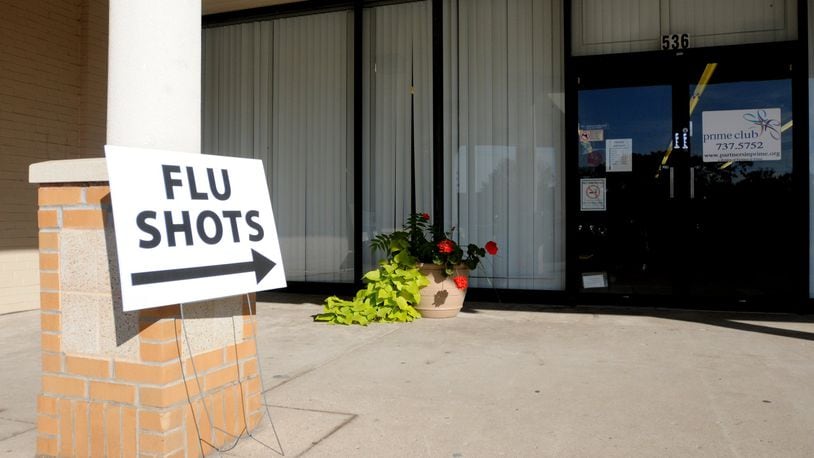Local health departments only track flu-associated hospitalizations and pediatric deaths, and there have not been any pediatric deaths in Butler County. There have been 27 pediatric deaths across, including a 16-year-old Ohio girl from Cuyahoga County. The Butler County General Health Department does not track adult deaths, but county Health Commissioner Jenny Bailer said they did receive information about a Butler County adult's death due to the flu. Details are not known of that death, and her office received the report of the adult death by chance.
RELATED: Here’s what you can do to prevent the flu
The numbers show this flu season around Butler County is not any worse than any other year, but it is peaking a week earlier than the there-year average, Bailer said. There was a 20-person hospitalization jump from the week ending on Dec. 28 (14) and the week ending on Jan. 4 (34), according to the Butler County health department. Historically, flu hospitalizations peak in mid-January, with the three-year average topping close to 40, according to the county health department data.
While from the end of the year to the beginning of the year is “a pretty good jump,” there haven’t been many hospitalizations in the past few days this week, Bailer said.
Middletown Health Commissioner Jackie Phillips believes “this is a worse flu season in general,” mostly because people are sick with other illnesses as well as the flu, or flu-like symptoms, but aren’t hospitalized.
“What we might be seeing is many other respiratory illnesses … and that’s complicating everything,” she said.
Atrim Hospital, which is in the Warren County portion of Middletown, reported to the city 20 influenza-associated hospitalizations from Butler and Warren counties since Oct. 1.
While data isn’t available, Bailer said doctors’ offices and pharmacies have been “hit hard” with so many showing flu and flu-like symptoms.
The flu is caused by influenza viruses that infect the nose, throat and sometimes the lungs. It can cause mild to severe illness, and at times can lead to death. Medical professionals say annual flu vaccines are the best way to prevent flu.
Flu symptoms can include fever (though not everyone gets a fever), coughing, a sore throat, a runny or stuffy nose, body aches, headache, chills, fatigue, and sometimes diarrhea and vomiting.
Besides the flu shot, health departments recommend everyday preventive actions to slow the spread of germs that cause respiratory illnesses, like the flu:
• stay away from people who are sick,
• covering coughs and sneezes, and
• frequent hand-washing.
Bailer also recommends people ask their doctor about Tamiflu, which is used to treat flu viruses.
This time of year is when most of the country becomes classified as “widespread” when it comes to the flu, according to CDC historical data.
“This is what we see year after year,” Bailer said. “This kind of thing happens when kids go to school, and families get together (over the holidays).”
FLU PREVENTION
Anyone can get the flu, even those who are healthy, and serious problems related to flu can happen at any age. But there are some people who are at a higher risk of developing serious flu-related complications.
• people 65 years and older,
• people of any age with certain chronic medical conditions, like asthma, diabetes or heart disease,
• pregnant women, and
• children younger than 5 years.
The most important step in flu prevention is the annual flu vaccine, which medical professionals say reduces flu-related illnesses and the risk of serious flu complications. The Center for Disease Control and Prevention recommends everyday preventive actions to slow the spread of germs that cause respiratory illnesses, like the flu:
• stay away from people who are sick,
• covering coughs and sneezes, and
• frequent hand-washing.
Source: Butler County General Health District
About the Author
